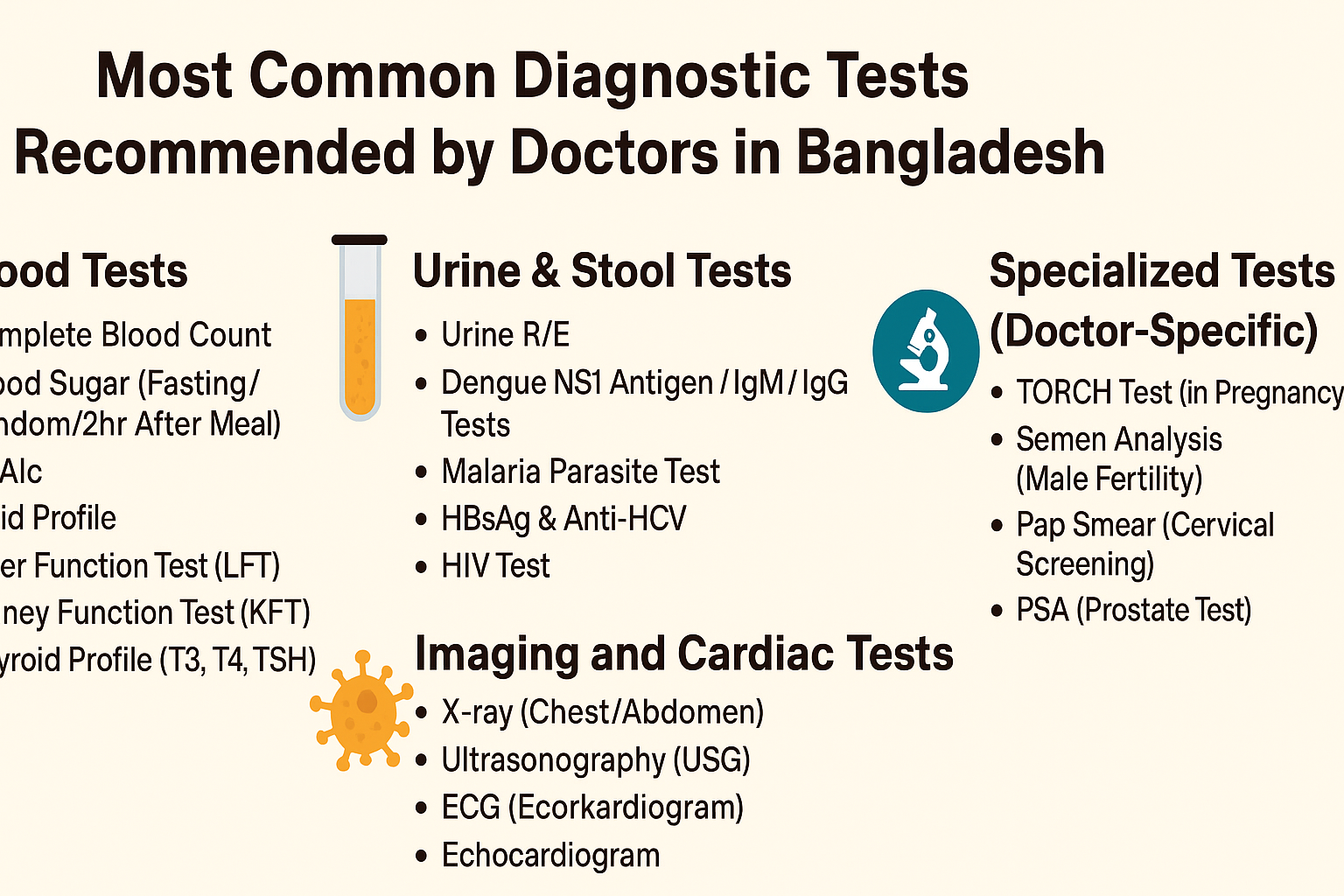
In Bangladesh, healthcare providers rely heavily on diagnostic tests to detect illnesses early, monitor treatment progress, and ensure accurate clinical decisions. Whether you're visiting a general practitioner or a specialist, chances are you’ll be asked to perform one or more common diagnostic tests. This article outlines the most frequently prescribed tests in Bangladesh's hospitals, clinics, and diagnostic centers.
🩸 1. Blood Tests
Blood tests are the first line of investigation for most medical conditions. Doctors commonly prescribe:
-
Complete Blood Count (CBC): Evaluates red cells, white cells, hemoglobin, and platelets. Useful for diagnosing infections, anemia, and general health status.
-
Blood Sugar Test (Fasting/Random/2hr After Meal): Essential for diagnosing diabetes or monitoring blood glucose levels.
-
HbA1c: Provides an average of blood glucose over 2-3 months.
-
Lipid Profile: Measures cholesterol and triglycerides, crucial for heart disease risk.
-
Liver Function Test (LFT): Assesses enzymes and proteins produced by the liver.
-
Kidney Function Test (KFT): Includes creatinine and urea levels to monitor kidney health.
-
Thyroid Profile (T3, T4, TSH): Helps detect hyperthyroidism or hypothyroidism.
🧪 2. Urine & Stool Tests
-
Urine R/E (Routine Examination): Detects urinary infections, diabetes indicators, and kidney issues.
-
Stool R/E: Identifies parasites, infections, or digestive disorders.
🧬 3. Infectious Disease Screening
Infections are prevalent in tropical regions like Bangladesh, making these tests critical:
-
Widal Test: Used for typhoid fever detection.
-
Dengue NS1 Antigen / IgM / IgG Tests: Essential during dengue outbreaks.
-
Malaria Parasite Test: Conducted in high-risk zones.
-
HBsAg & Anti-HCV: Screen for Hepatitis B & C.
-
HIV Test: Often performed before surgeries or during pregnancy checkups.
🖥️ 4. Imaging and Cardiac Tests
-
X-ray (Chest/Abdomen): Detects pneumonia, fractures, or abdominal complications.
-
Ultrasonography (USG): Common in abdominal, pregnancy, and pelvic assessments.
-
ECG (Electrocardiogram): Analyzes heart rhythm and detects abnormalities.
-
Echocardiogram: Offers detailed imaging of the heart.
-
CT Scan / MRI: Advanced imaging for neurological or orthopedic diagnostics (mainly in city hospitals).
🩺 5. Specialized Tests (Doctor-Specific)
-
TORCH Test (in Pregnancy): Screens for infections affecting pregnancy.
-
Semen Analysis (Male Fertility): Used in infertility treatment.
-
Pap Smear (Cervical Screening): Essential for early detection of cervical cancer.
-
PSA (Prostate Test): For men above 45, especially with urinary symptoms.
✅ Conclusion
Diagnostic testing in Bangladesh has become more accessible, affordable, and accurate, thanks to the rapid growth of medical laboratories and diagnostic chains. If your doctor recommends any of these tests, don’t hesitate—early diagnosis can save lives. Always choose a certified diagnostic center for accurate results and consult your physician for interpretation.
-(1).png)




